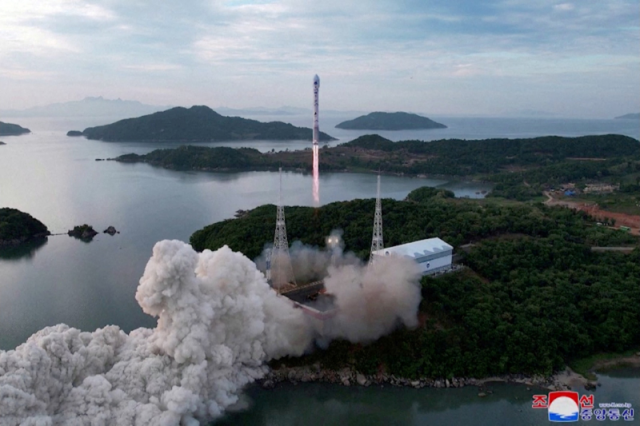
SEOUL — North Korea said its attempt to launch a new military reconnaissance satellite ended in failure on Monday when a newly developed rocket engine exploded in flight.
READ: North Korea plans to launch satellite between May 27 and June 4, Japan Coast Guard says
Pyongyang successfully placed its first spy satellite in orbit in November, after two failed attempts last year. The U.S. and its allies say the launches violate U.N. Security Council resolutions banning the nuclear-armed North’s use of ballistic missile technology.
The following is a timeline of North Korea’s space program, satellite launches and development of rocket technology.
Aug. 31, 1998: North Korea begins its space program by launching a Kwangmyongsong-1 satellite on a Paektusan rocket from the Tonghae Satellite Launching Ground. Pyongyang declares it a success, but U.S. officials say it broke up over the Pacific Ocean.
April 5, 2009: Then-leader Kim Jong Il oversees the launch of the Kwangmyongsong-2 satellite from the Tonghae complex, but it again fails and crashes in the ocean. State media suggest 14 North Korean soldiers were killed during the launch.
April 13, 2012: The Kwangmyongsong-3 satellite is launched from the newly completed Sohae Satellite Launching Station in the western region. Foreign media are invited to observe the launch, which once again is unsuccessful.
Dec. 12, 2012: North Korea successfully launches a second version of the Kwangmyongsong-3, putting an object in orbit. While the North claims it to be an observation satellite, it is not believed to carry a functioning transmission system.
April 2013: North Korea establishes the National Aerospace Development Administration (NADA) which purports to pursue space exploration for peaceful purposes.
Feb. 7, 2016: North Korea launches a satellite. The United States calls it a disguised test of an engine powerful enough to launch an intercontinental ballistic missile (ICBM). International observers say the satellite appears to be under control, but there is debate over whether it sent any transmissions.
Aug. 24, 2016: Hyon Kwang Il, director of scientific research at NADA, says “our aerospace scientists will conquer space and definitely plant the flag of North Korea on the moon”.
June 23, 2016: North Korea says it successfully tested an intermediate range ballistic missile (IRBM), with a range of 2,000 to 3,400 miles (3,200-5,400 km).
July 4, 2017: North Korea tests an ICBM for the first time, which it says has the potential to reach the continental United States. The missile, Hwasong-14, is tested again three weeks later.
Jan. 13, 2021: During a party congress, Kim Jong Un reveals a wish list that includes developing military reconnaissance satellites.
Dec. 19, 2022: North Korea says it has conducted a “final phase” test for the development of a spy satellite.
March 16, 2023: North Korea test-launches the Hwasong-17 ICBM, its biggest missile, which some analysts believe incorporates technology for space launch vehicles.
May 31, 2023: North Korea attempts to launch a reconnaissance satellite, but the rocket plunges into the sea.
July 5, 2023: South Korea’s military says it retrieved the wreckage of the spy satellite, and found it had no meaningful military use as a reconnaissance platform.
Aug. 24, 2023: North Korea makes a second attempt to put a spy satellite in orbit, but it fails when the rocket booster experiences a problem. North Korea’s spy agency says it was not a major issue and vows to try again in October.
Sept. 13, 2023: President Vladimir Putin says Moscow will help North Korea build satellites during a tour he gives to Kim Jong Un of Russia’s space station in eastern Russia. Neither leader elaborates.
Nov. 21, 2023: North Korea notifies Japan of its plan to launch a satellite between Nov. 22 and Dec. 1.
Nov. 21, 2023: North Korea launches a rocket and says it successfully put a reconnaissance satellite in orbit.
Nov. 28, 2023: North Korean state media says Kim Jong Un reviews spy satellite photos of the White House, Pentagon and U.S. aircraft carriers. Analysts say while it is feasible for a medium-resolution camera to get such images, many more satellites would be needed to be useful in a conflict.
Dec. 31, 2023: North Korea vows to launch three new spy satellites in 2024.
Jan. 15, 2024: North Korea says it tested a new solid-fuel hypersonic missile amid an intensifying race for the next generation of long-range rockets that are difficult to detect and intercept.
May 26, 2024: North Korea notifies Japan of a plan to launch a satellite between May 27 and June 4.
May 27, 2024: North Korea says its launch of a new satellite carrier rocket fails when it exploded during the flight of the first stage. An initial analysis suggested that the cause was a newly developed liquid fuel rocket motor, state media reports.
—Reporting by Jack Kim, Josh Smith and Ed Davies, Editing by Gerry Doyle









